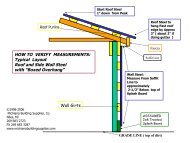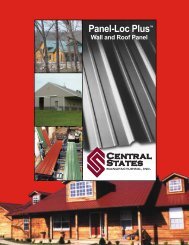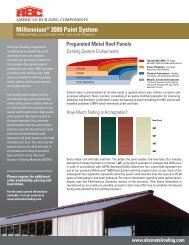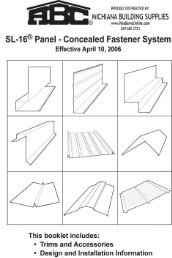You also want an ePaper? Increase the reach of your titles
YUMPU automatically turns print PDFs into web optimized ePapers that Google loves.
APPLICATION, STORAGE AND HANDLING INFORMATION<br />
SAFETY PRECAUTIONS<br />
Improper unloading and handling of bundles and crates may<br />
cause bodily injury or material damage. Use extreme care in<br />
the operation of power lifting devices such as cranes and<br />
forklifts and follow the safety instructions provided by their<br />
manufacturer. Crates, boxes and bundles may be bulky,<br />
heavy, or both. The improper or unaided lifting of them may<br />
cause bodily injury. The manufacturer is not responsible for<br />
bodily injuries or material damage due to improper handling<br />
during unloading, storage, or job site placement.<br />
Protective heavy duty gloves should be worn when handling<br />
metal panels and trim products. Safety goggles or face shield<br />
should be worn while cutting or drilling metal products with<br />
power tools. Follow the safety instructions provided by the<br />
manufacturer of the power tools.<br />
STORAGE AND HANDLING<br />
To preserve and protect the attractive appearance of<br />
American Building Components' roofing and siding from<br />
damage caused by moisture, corrosive chemicals or<br />
improper handling, it is necessary that you take a few simple<br />
precautions. When material is received bundled, panels<br />
should be inspected for moisture. If there is moisture, the<br />
panels should be separated and dried. If shipping damage is<br />
found, the carrier should be advised and a notation made on<br />
the bill of lading.<br />
On job sites, reasonable care should be taken when<br />
handling painted surfaces during installation in order to<br />
protect the finish. Although the paint coating is tough and<br />
provides impact resistance, dragging panels across the<br />
surface of one another will almost certainly mar the finish.<br />
BUILDING DESIGN AND CONSTRUCTION<br />
It is important to protect metal panels from potentially<br />
corrosive situations and materials. This will insure the good<br />
performance and long life of the metal. If installing metal<br />
panels over green lumber, damp lumber, or treated lumber<br />
(CCA or ACQ), a barrier must be installed to separate the<br />
wood from the metal. A barrier may be formed with plastic,<br />
builders felt, or other suitable material. Avoid contact with, or<br />
water runoff from, dissimilar metals such as copper, lead or<br />
graphite. Dissimilar metals under the roof panels may be<br />
separated with asphalt, builders felt, caulking compounds or<br />
gasket material.<br />
Metal panels must further be protected from contact with<br />
strong chemicals such as fertilizers, lime acids, animal waste<br />
VENTILATION<br />
Sufficient air movement should be provided by means of a<br />
ridge or rotary vent, power operated fans, or other openings<br />
to minimize condensation. Contact the equipment<br />
Use extreme care when walking, sitting, standing, or<br />
kneeling on a metal roof to avoid a fall. Galvalume® and<br />
galvanized panels have a light coating of oil to protect the<br />
panels from moisture prior to erection. They can be<br />
extremely slippery, as are painted panels, when they are wet.<br />
If necessary, remove the oil coating with a non-abrasive<br />
detergent and water mixture followed by a clear water rinse.<br />
Insure the panels are dry prior to installation.<br />
When nails are used to fasten the panels, goggles should be<br />
worn to prevent possible eye injuries. Off center strikes by<br />
the hammer may cause nails to ricochet or metal fragments<br />
to become dislodged, striking the user or those nearby.<br />
Insure adequate safety measures and warnings are in place<br />
and followed.<br />
Prolonged storage of sheets in bundles is not<br />
recommended. If conditions do not permit immediate<br />
erection, extra care must be taken to protect the material<br />
from damage caused by moisture.<br />
Store bundled sheets ONLY IN A DRY PLACE. Sheets<br />
should be unbundled, stood on end against an interior wall<br />
to allow for air circulation. If unable to store sheets in an<br />
upright position, strapping bands should be broken and<br />
sheets should be blocked off the floor with one end slightly<br />
elevated. Stacked sheets should then be completely<br />
protected from the elements while maintaining good airflow<br />
to prevent condensation. A properly draped canvas<br />
tarpaulin, that allows air flow, is an example of a good<br />
protective cover. Do not use plastic as it causes sweating or<br />
condensation to occur.<br />
and soil. All of these have the potential to initiate corrosion in<br />
metal panels. Metal panels should not be in permanent<br />
contact with soil.<br />
Temperature variations, (dew point) between the outside air<br />
and the interior building air mass can cause condensation to<br />
occur on the inside of the building on the panel's surfaces.<br />
Proper venting and air flow consideration and the use of a<br />
vapor barrier such as vinyl backed insulation can eliminate<br />
this problem. If left unattended, condensation can cause the<br />
premature degradation of the metal and void any applicable<br />
warranties.<br />
The substructure, on which the panels are to be<br />
installed, must be “on plane” (1/4" tolerance) from eave<br />
to edge. Maximum recommended panel length is 36';<br />
minimum panel length is 3'.<br />
manufacturer for specific information or a qualified<br />
mechanical engineer.<br />
PAGE S4<br />
FOR THE MOST CURRENT INFORMATION<br />
VISIT www.abcmetalroofing.com<br />
SUBJECT TO CHANGE WITHOUT NOTICE<br />
EFFECTIVE DATE APRIL 10, 2006






